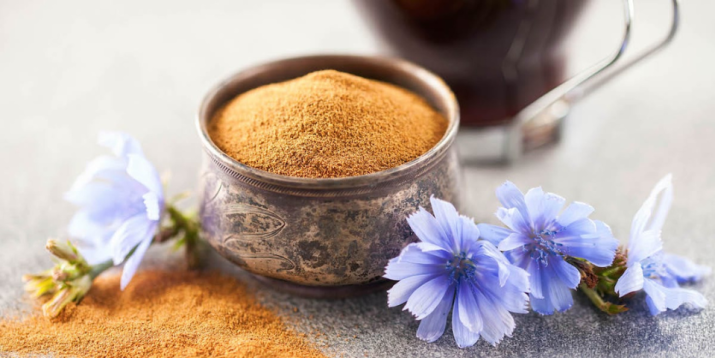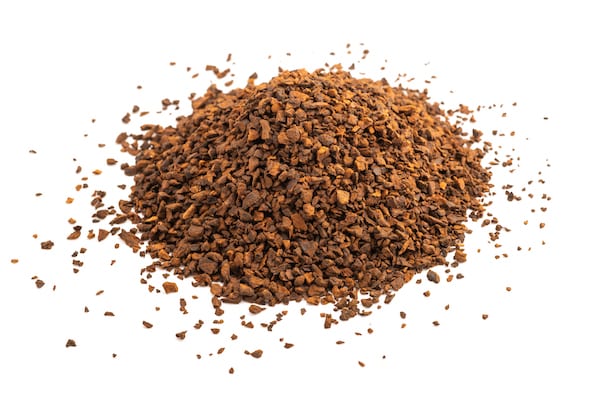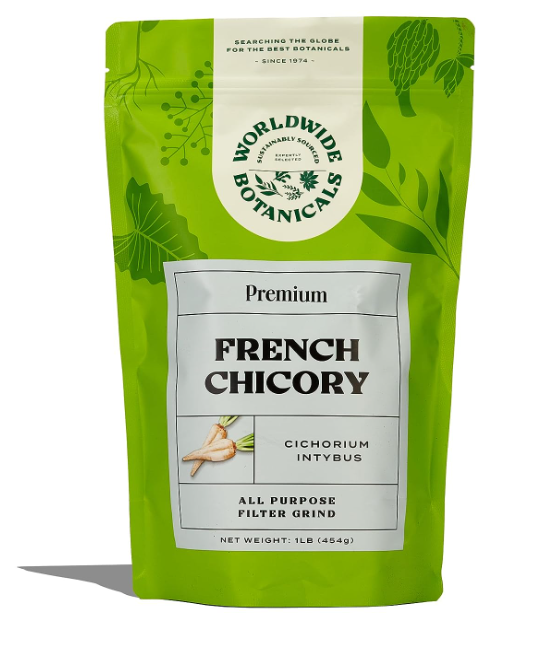Chicory Root: Coffee Swap, Weight-Loss Aid, and More!

You might not know chicory root, but chances are you would recognize its periwinkle blue flowers. Let’s take a look at the benefits of chicory root fiber, the side effects of chicory root extract, and why some people use it as a coffee substitute.
What Is Chicory Root?
A relative of dandelions, chicory (or Cichorium intybus) is a wildflower that blooms abundantly along roads and in meadows all summer. The use of chicory root and leaves dates back to ancient Egypt, and since then, its presence in herbalism, as well as the kitchen, has only grown.
Its long, serrated leaves look and taste similar to dandelion greens and are used raw in salads with greens like endive or radicchio. They’re also often braised to tame their bitterness.
Though prebiotic chicory root extract or supplements are more common, some European countries eat chicory root as a vegetable. Chicory root looks like a parsnip, and the ancient Greeks and Romans grew it as a vegetable, too.
Chicory Root Benefits

Like maca root and rhodiola rosea, chicory root is used in herbalism for various reasons. Research studies validate some of chicory’s traditional uses — mostly attributed to its unique fiber content — but note that more research is needed.
1. Chicory root contains prebiotic fiber
Due to chicory root’s bitter compounds and relatively high amount of the prebiotic fiber inulin (a type of resistant starch), research has associated it with a wide array of benefits. One of the most popular among them is digestive health, explains Liz Wyosnick, MS, RDN.
Chicory root has one of the highest amounts of inulin compared to other foods, says Wyosnick. Inulin is a prebiotic, which makes it a great food source for beneficial gut bacteria. Jerusalem artichoke is the runner-up when it comes to inulin, but the fiber is also in foods like leeks, onions, asparagus, and garlic.
Like insoluble fiber (the type found in dark leafy greens, nuts, and seeds, and whole grains), inulin has a “bulking effect” on your stool, which can make it softer and easier to pass. Thus, chicory root fiber and other types of prebiotic fiber may help prevent occasional constipation.
2. Chicory root and weight management*
All of that fiber leads to another chicory root benefit. Fiber (including inulin), along with protein, is believed to help you feel full longer, making it a great part of a healthy weight management strategy.
3. Chicory root can be used as a caffeine-free coffee swap

This chicory root benefit is a tasty one that can help you cut back on caffeine. “Chicory root is often used as a swap for coffee because it has a bitter taste and comparable color to that of black coffee, and it does not contain any caffeine,” says Wyosnick.
If you’ve ever been to New Orleans, you may have washed down a beignet with chicory coffee, made from roasted chicory root. Chicory root coffee started out of necessity as a way to stretch limited supplies of coffee beans.
Young chicory roots are slightly bitter, with a hint of caramel flavor, similar to coffee. The chicory roots are roasted, ground, then brewed like coffee.
The only drawback of preparing chicory root this way: You don’t get the fiber.
Side Effects of Chicory Root
While more fiber is usually a good thing, you should take it slow, especially with the inulin found in chicory root. Chicory root is generally safe, but those new to it may experience the following symptoms:
- Gas
- Bloating
- Diarrhea
- Abdominal cramping
- Increased urination
“The inulin within the bitter compound of ground chicory root is disguised well, and you can easily consume enough of it to cause digestive discomfort,” cautions Wyosnick. “Chicory root is also considered a mild diuretic by some and may cause you to urinate more, so it is important to drink plenty of plain water if consuming a drink or food item that contains chicory root.”
As with any fiber supplement, start small and work your way up — and drink plenty of water along the way.
Where to Find Chicory Root

You can find whole chicory root at specialty grocery stores, and chicory root coffee or tea is usually available at regular supermarkets (Cafe du Monde is a popular brand).
Chicory root supplements are available at health food stores, larger supermarkets, some pharmacies, and online.
But before you buy any supplement, consider these questions: How is the supplement produced? Is it processed without harmful solvents or other additives? Is the company reputable? Are they making claims that sound too good to be true?
Keep in mind that supplement companies have to abide by industry standards for their claims, which are regulated by the U.S. Food and Drug Administration. And always be sure to discuss any supplements you are considering with your doctor.
Here are some chicory root products available on Amazon:
- Worldwide Botanicals, Roasted French Chicory Root
- Maui Herbs, Chicory Herbal Supplement, 1200 mg capsules
- Micro Ingredients, Organic Chicory Root Inulin Powder
*These statements have not been evaluated by the Food and Drug Administration. This product is not intended to diagnose, treat, cure, or prevent, any disease.
